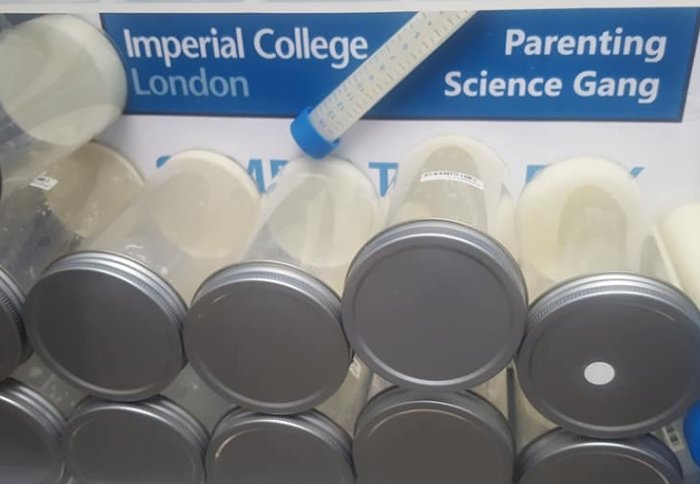Mothers donate breast milk for pioneering citizen led research
by Frankie Bolt

Women gather from across the country to donate milk for a study analysing how the composition of breast milk changes as children get older.
On the 21 February 2018 over 120 breastfeeding women and their children visited Charing Cross hospital to take part in a unique citizen science event, aimed at improving our understanding of how the composition of breast milk changes as children get older. The experimental idea was formed by members of the Parenting Science Gang (PSG) in collaboration with Dr Simon Cameron and Dr Natalie Shenker from the Department of Surgery and Cancer at Imperial College London.
What makes this project different is that the idea came from members of the PSG who, although not scientifically trained, want to base parenting decisions on sound evidence. They recognised that whilst women are advised to breastfeed exclusively until six months, and beyond two years as long as mother and child wish to, there are few studies examining the impact on milk composition over the natural term of breastfeeding.
Mothers travel from far and wide to contribute to research
 Breastfeeding mothers, most with their children, travelled from all over the country to express milk, which would later be analysed using rapid evaporative ionisation mass spectrometry (REIMS). This novel technique, developed by Imperial’s Professor Zoltan Takáts, provides a metabolic fingerprint of samples by evaporation using a carbon dioxide laser. The vapour generated during this process is channelled to a mass spectrometer for metabolic profiling. The underlying principles are the same as those used in the iKnife, which differentiates between healthy and malignant tissue intra operatively, and in REIMS clinical microbiology diagnostic platform.
Breastfeeding mothers, most with their children, travelled from all over the country to express milk, which would later be analysed using rapid evaporative ionisation mass spectrometry (REIMS). This novel technique, developed by Imperial’s Professor Zoltan Takáts, provides a metabolic fingerprint of samples by evaporation using a carbon dioxide laser. The vapour generated during this process is channelled to a mass spectrometer for metabolic profiling. The underlying principles are the same as those used in the iKnife, which differentiates between healthy and malignant tissue intra operatively, and in REIMS clinical microbiology diagnostic platform.
Breastfeeding mothers design innovative experiment with Imperial researchers
The research day demonstrated the success of citizen-led science projects and their role in setting future research questions. Members of Professor Takáts’ research group and Dr Shenker’s team at the Hearts Milk Bank, including lactation consultant Jo Watt, worked with the PSG to ensure milk collection (using breastfeeding pumps provided by Central Medical Supplies) and the analysis ran smoothly. Dr Cameron said: “The enthusiasm and dedication of the mothers who travelled from as far as Galloway, in Scotland, was truly remarkable. Whilst the descent of 120 children to the Charing Cross Hospital campus of Imperial College London in one day was technically challenging the outcome was a very enjoyable, creative day that culminated in ground breaking research”.
The findings from this study and the others we have planned will help to change how we think about breastfeeding. Parents need that knowledge. Dr Natalie Shenker
Dr Shenker added, “It is difficult to believe how little we know or understand about human milk, which is likely to have driven the evolution and adaptation of our species. The findings from this study and the others we have planned in partnership with labs around the world will help to change how we think about breastfeeding. Parents need that knowledge”. Sample analysis is currently being performed and it is expected that members of PSG will work alongside Dr Simon Cameron and Dr Shenker in the analysis and publication of the findings.
Article supporters
Article text (excluding photos or graphics) © Imperial College London.
Photos and graphics subject to third party copyright used with permission or © Imperial College London.
Reporter
Frankie Bolt
Department of Electrical and Electronic Engineering